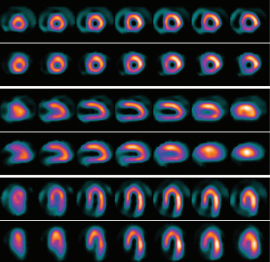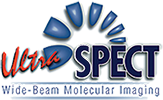Henry Ford Health System
I’m off to St. Louis to attend the annual Society of Nuclear Medicine and Molecular Imaging (SNMMI) annual meeting. In addition to getting out for a jog and exploring the city, I also look forward to connecting with the many friends who I have met throughout my many years in the nuclear medicine industry. This year I come to the meeting invigorated, having witnessed a great movement since last year in the trend towards adopting measures to achieve lower dose.
For years I have come to this meeting with a great passion for the ability to lower dose to patients and staff in nuclear medicine. I’ve shared with you the benefits of UltraSPECT’s cost effective, proven solution, and many of you have been adopters. This year, even more of you are adopting and I am so pleased to say that the low dose movement in nuclear medicine has caught on.
One example of this is the long-term agreement we have recently executed with BC Technical to provide their customers with the benefits of UltraSPECT. BC Technical is a nationwide, independent provider of CT, MRI, NM, SPECT/CT, PET, and PET/CT service, refurbished systems and parts. The ability to lower radiation exposure to patients and staff is an important initiative for BC Technical’s customers and UltraSPECT provides them with the most cost effective multi-vendor solution in the market. Additional benefits are realized through utilization of shorter scan times which increase throughput and can improve image quality by addressing patient movement as compared to traditional scan times. This agreement will allow our mutual customers easier access to UltraSPECT products across the nation.
Working with providers, service providers, pharmacies, and directly with many of you through your hospitals, we are seeing great momentum and demand for low dose software in NM. The need is there. It is recognized, and we are happy to help you bring lower dose for patients – not to mention the staff providing the care. This change cannot be underestimated.
Meet me in St. Louis! We will be at booth #720.
Best regards,
Yossi
UltraSPECT in the News
- UltraSPECT takes NJ order, AuntMinnie, April 1, 2014
- Hamilton Cardiology Associates Implement UltraSPECT Software to Lower Radiation Dose, DOTmed Healthcare Business News, April 2, 2014
- Hamilton Cardiology Associates implement UltraSPECT software to lower radiation dose, Cardiovascular Business, April 5, 2014
Low Dose News
At SNMMI 2014 – Get educated on lower dose!
If you’re planning on being in St. Louis at this year’s SNMMI 2014 Annual Meeting, make sure to attend the following categorical seminars and continued education sessions:
- Saturday, June 7
- Advances in Clinical and Molecular Nuclear Cardiology – Learn from industry luminaries in a session that takes you through the latest techniques and newest technologies addressing the challenges and issues in nuclear cardiology.
- Dose Reduction in Nuclear Medicine and Hybrid Imaging – This categorical seminar will extensively discuss and offer insight on the issue of radiation dose and will include everything from methods of adjusting doses for patients appropriately to putting radiation risk in perspective for patients, parents and clinicians.
- Monday, June 9
- Low Dose, Fast Acquisition: Practical Cardiac SPECT with Today’s Technology – Discuss improved cardiac SPECT reconstruction techniques, advantages and disadvantages of high-sensitivity dedicated cardiac SPECT systems and learn how to how to incorporate the use of these techniques and systems in clinical practice.
- Radiation Safety in Pediatric High-Dose I-131-MIBG and Radioiodine Therapies – Learn about the sources of radiation exposure to technologists, family caregivers and nurses during high-dose I-131-MIBG therapies and understand radiation safety considerations involved.
Customer Success Story
 A proud recipient of the Malcolm Baldridge National Quality Award for performance excellence, the Henry Ford Health System is a Detroit-based not-for-profit corporation made up of hospitals, medical centers and one of the nation's largest group practices. Henry Ford Wyandotte Hospital, part of the Henry Ford Health System, is a 401-bed hospital serving the Downriver region and surrounding communities of southeast Michigan.
A proud recipient of the Malcolm Baldridge National Quality Award for performance excellence, the Henry Ford Health System is a Detroit-based not-for-profit corporation made up of hospitals, medical centers and one of the nation's largest group practices. Henry Ford Wyandotte Hospital, part of the Henry Ford Health System, is a 401-bed hospital serving the Downriver region and surrounding communities of southeast Michigan.
Since 2005, the hospital’s cardiology and imaging department have delivered shortened exam times to patients through UltraSPECT software. Earlier this year, the hospital took their dedication to delivering high quality care further by upgrading to UltraSPECT’s Xpress3.Cardiac™ and in doing so, exhibiting their leadership and initiative in best practices by proactively lowering radiation exposure to all patients. Beyond providing the benefits of shortened exam time and reduced radiation dose, the Xpress3.Cardiac solution, employed on both department cameras, now equalizes the image quality produced in the department. Although the ages and manufacturers of the cameras vary, the hospital’s use of the complete suite of UltraSPECT solutions allows them to produce standardized images of uniform quality and ensures a consistent, high level of care to all patients.
In addition, the Xpress3.Cardiac solution provides support for cardiac attenuation correction thus improving the quality and diagnostic value of scans even further. The radiologists at Henry Ford Wyandotte Hospital also benefit from the proprietary, innovative reconstruction algorithms of UltraSPECT's Wide-Beam Reconstruction (WBR™) solution, which allows them to adjust noise levels and reduce or increase correction on images produced from bone scans to allow for the most high quality image at any dose.
To learn more about Henry Ford Wyandotte Hospital, read here.
Product Spotlight
Xpress3.Cardiac™
 UltraSPECT®'s Xpress3.Cardiac solution delivers high-grade versatility that transforms and revitalizes facilities’ existing gamma camera systems, circumventing the demands for major capital expenditures on new cameras. The Xpress3.Cardiac leverages UltraSPECT's unique proprietary Wide-Beam Reconstruction (WBRtm) technology, the only iterative image reconstruction algorithm on the market that implements resolution recovery and noise control levels that are adaptive to the input data count density. Altogether, the Xpress3.Cardiac offers nuclear medicine practices a complete solution to meet elevate their imaging quality and efficiency. Benefits provided by the solution include:
UltraSPECT®'s Xpress3.Cardiac solution delivers high-grade versatility that transforms and revitalizes facilities’ existing gamma camera systems, circumventing the demands for major capital expenditures on new cameras. The Xpress3.Cardiac leverages UltraSPECT's unique proprietary Wide-Beam Reconstruction (WBRtm) technology, the only iterative image reconstruction algorithm on the market that implements resolution recovery and noise control levels that are adaptive to the input data count density. Altogether, the Xpress3.Cardiac offers nuclear medicine practices a complete solution to meet elevate their imaging quality and efficiency. Benefits provided by the solution include:
- Significantly reduced injection doses – which minimizes patient exposure to radiation
- Dramatically reduced scan times, providing greater overall patient comfort and higher throughput
- Simultaneous reduced-dose and shorter-scan-time imaging – most market offerings can deliver only one or the other
- High image quality, yielding undiminished diagnostic certainty
For more information about Xpress3.Cardiac, and the complete line of UltraSPECT solutions, click here.
